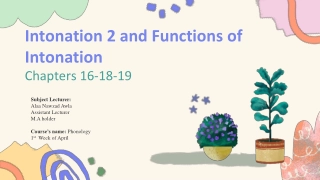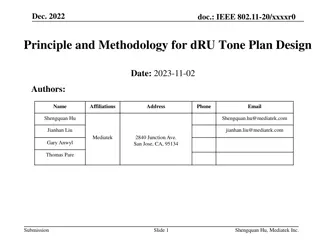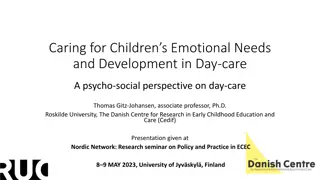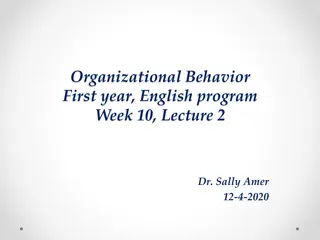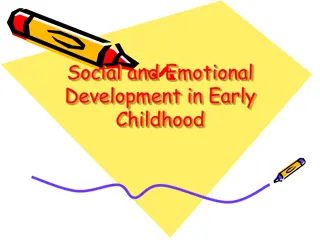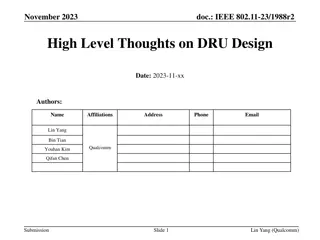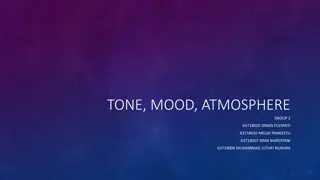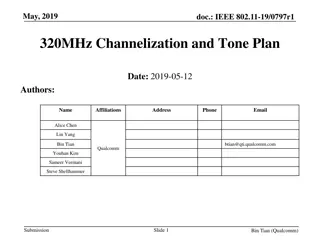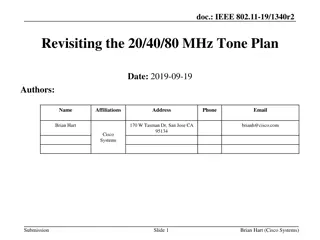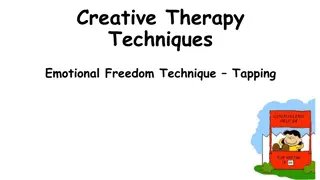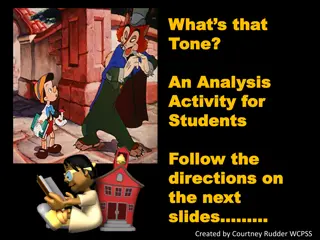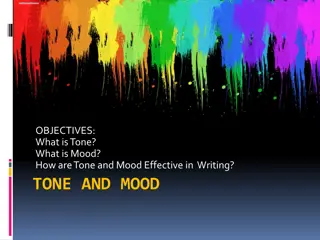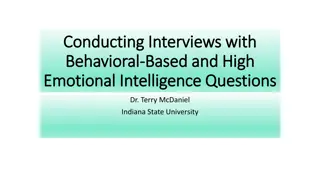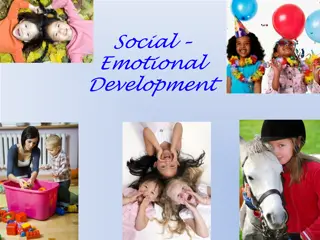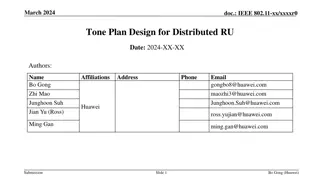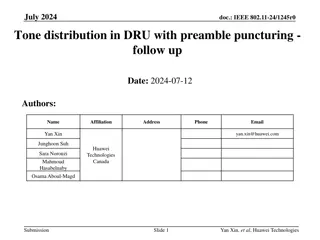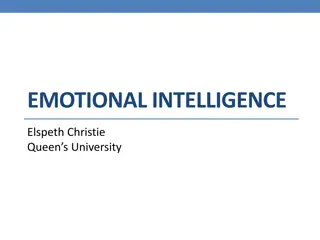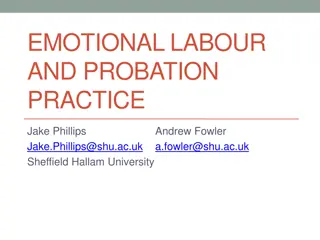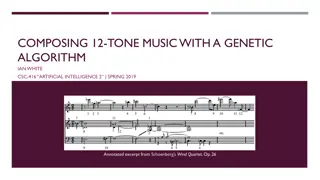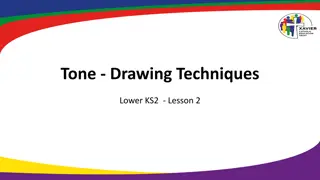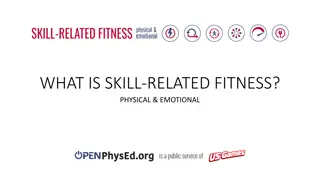Understanding Intonation and Tone in Phonetics
Intonation and tone play crucial roles in conveying meaning and expression in spoken language. Intonation refers to the melodic pattern of speech that can indicate various emotions or grammatical functions, while tone represents the pitch, quality, and strength of vocal sounds within words. By maste
4 views • 27 slides
Principle and Methodology for dRU Tone Plan Design in IEEE 802.11-20
Introduction of Distributed Tone RU (dRU) as a potential UHR PHY feature to address PSD limitations for 6GHz LPI and enhance Rate vs. Range performance. Emphasis on dRU tone plan design criteria, methodologies, and performance simulations. Detailed examination of design principles, methods, consider
4 views • 23 slides
Understanding Emotional Patterns in Families
Families play a crucial role in shaping individuals' emotional responses and behaviors. Caregivers influence how we perceive and manage emotions, impacting our emotional well-being. By examining how different emotions are accepted, rejected, and modeled within families, one can gain insights into th
10 views • 14 slides
Understanding Children's Emotional Development in Daycare from a Psycho-Social Perspective
Scientific evidence emphasizes the early onset of emotional development and its profound impact on lifelong outcomes. The quality of childcare processes plays a pivotal role in shaping children's social-emotional development, highlighting the importance of nurturing emotional relationships in daycar
0 views • 10 slides
Understanding Emotional Labor in Organizational Behavior
Emotional labor involves employees expressing organizationally desired emotions during work interactions, impacting job performance. Employees may face emotional dissonance when projecting one emotion while feeling another, leading to surface or deep acting. Affective Events Theory (AET) suggests th
0 views • 19 slides
Understanding Emotional Wellness for Inner Well-Being
Exploring the importance of emotional wellness in cultivating inner well-being, this content delves into the facets of social, mental, and emotional well-being. It emphasizes the significance of acknowledging and accepting our feelings, maintaining a positive outlook, and finding purpose and peace w
1 views • 27 slides
Early Childhood Social and Emotional Development Insights
Social and emotional development in early childhood is influenced by various factors such as family dynamics, parenting styles, peer interactions, and cultural backgrounds. Erikson's stages highlight the importance of initiatives and self-understanding in shaping emotional growth. Parents play a cru
2 views • 35 slides
High-Level Thoughts on Distributed Tone Resource Unit (dRU) Design in IEEE 802.11-23/1988r2 November 2023
Various aspects of Distributed Tone Resource Unit (dRU) design in IEEE 802.11-23/1988r2, such as PSD limitations, distributed transmission regulations, application areas, and open questions are discussed in this presentation by Lin Yang from Qualcomm. Topics include tone distribution, power pooling
0 views • 19 slides
Understanding Tone, Mood, and Atmosphere in Literature
Atmosphere, mood, and tone are essential elements in literature that shape the emotional tone of a literary work, influence reader expectations, and convey the author's attitude. They are interconnected yet distinct aspects that add depth and complexity to storytelling. This analysis delves into the
0 views • 12 slides
Understanding Emotional Intelligence in the Workplace
Explore the significance of emotional intelligence in the workplace, its definition, five competencies, case studies, and strategies to enhance skills. Dive into scenarios, role-plays, misconceptions, and why emotional intelligence is crucial for professional success. Learn about managing emotions,
0 views • 33 slides
Understanding Emotional Intelligence: Key Principles and Skills
Emotional intelligence, as presented by David Taylor, is crucial in perceiving, understanding, and managing emotions in oneself and others. It plays a vital role in professional and personal relationships by enhancing emotional awareness, recognition, and management. The principles of emotional inte
1 views • 22 slides
Channelization and Tone Plan Discussion for 320MHz EHT
IEEE 802.11-19/0797r1 discusses the channelization and tone plan design for 320MHz in EHT (11be). The slides cover the benefits of a 320MHz channel, double peak throughput, various BW modes, existing and new configurations, and proposals for tone plans to maximize efficiency. Detailed considerations
0 views • 10 slides
Revisiting the IEEE 802.11-19/1340r2 Tone Plan Optimization
Revisiting the tone plan optimization for IEEE 802.11-19/1340r2, addressing issues with RUs near band edges, accommodating various STA bandwidth capabilities, and the inefficiencies of non-SST 11ax STAs in different BSS scenarios. Proposals include adapting to unknown future 11ax features, minimizin
5 views • 12 slides
Understanding the Impact of Cortisol on Emotional Expression in Young Children Facing Economic Hardship
This study explores how the stress hormone cortisol is related to emotional expression in young children experiencing economic hardship. Cortisol levels can indicate stress, but prolonged exposure to stress can lead to desensitization. The research focuses on children attending Head Start preschools
0 views • 15 slides
Understanding Emotional Abuse: Signs, Effects, and How to Respond
Explore the intricacies of emotional abuse through the eyes of Dr. Katia Reinert, Associate Director of GCHM. Delve into the techniques used by emotional abusers, self-assessment for identifying abuse, effects of abuse, and guidance on how the Christian community can help. Discover the challenges of
1 views • 31 slides
Understanding Emotional Freedom Technique (EFT) Tapping for Emotional Wellness
Emotional Freedom Technique (EFT) tapping, rooted in acupressure, offers a holistic approach to addressing stress, fear, and phobias. This body-centered therapy draws on ancient Chinese practices, stimulating specific acupoints to improve energy flow. Studies show effectiveness in treating depressio
0 views • 4 slides
Understanding Tone and Mood in Text Analysis Activities
This activity guide created by Courtney Rudder of WCPSS provides students with text excerpts to analyze for tone and mood. Students work in pairs to discuss the text and use a list of tone and mood words provided to help them. The guide progressively offers more challenging texts for analysis, encou
1 views • 9 slides
Understanding Tone and Mood in Writing
Explore the concepts of tone and mood in writing, how they are defined, and their impact on creating an atmosphere and eliciting emotions in the reader. Discover how tone reflects the author's attitude and the multiple tones that can exist in a piece of writing. Dive into the general atmosphere crea
0 views • 34 slides
Understanding the Hemiplegic Arm and Hand After Stroke
A stroke can cause weakness in the arm and hand, affecting movement and daily tasks. Careful handling reduces pain and complications. Common issues include pain, swelling, altered sensation, and muscle tone changes. Limbs may have low tone (limp) or high tone (stiff), leading to challenges in moveme
0 views • 11 slides
Understanding Tone in Literature: An Analysis of Hamlet
Explore the concept of tone in literature through examples from Shakespeare's "Hamlet." Learn how tone influences the reader's emotional response and enhances understanding of a piece of writing. The analysis delves into Act One, Scene One to reveal the tension and tone Shakespeare sets up in the pl
0 views • 10 slides
Enhancing Emotional Intelligence Through Behavioral Interview Questions
Explore the key aspects of emotional intelligence, including social-emotional competencies and cognitive, affective, and behavioral competencies. Learn how to conduct interviews focused on emotional intelligence and discover the importance of relationships, self-awareness, responsible decision-makin
0 views • 44 slides
Understanding Social and Emotional Development in Young Children
Explore the general emotional patterns and specific emotions in young children aged 4 to 6 years. Understand the positive and negative characteristics such as self-centeredness, independence, anxiety, and fear, and learn how to deal with common fears like imaginary dangers and separation anxiety. Re
1 views • 19 slides
Exploring Poetry Through Imagery and Tone in Billy Collins' Work
Diving into Billy Collins' poem "Introduction to Poetry," this analysis delves into the use of imagery, figurative language, tone, and style to convey the poet's frustration with how readers often approach poetry superficially. Collins encourages readers to immerse themselves in the emotional depth
0 views • 5 slides
Safeguarding Infants from Emotional Maltreatment: What Works?
Safeguarding infants from emotional maltreatment is crucial during the first two years of life. Emotional abuse, though not always accompanied by physical or sexual abuse, can have severe impacts on a child's development. The paper explores the structure, prevalence, and impact of emotional abuse on
3 views • 59 slides
Understanding Verbal Irony and Tone Through Examples
Verbal irony is the expression of words conveying the opposite of their literal meaning. It is not the same as lying and is used to emphasize a point. Tone plays a crucial role in conveying irony, as it can affect how the message is perceived. Sarcasm, though related, has a negative agenda of mockin
0 views • 7 slides
Unveiling Writing Strategies: Theme vs. Topic Focus and Emphasis on Tone by Emily Mowery
Dive into the nuances of topic vs. theme in literature with a focus on analyzing tone. Explore writing activities, examples from "Poisonwood Bible," tone word banks, and engaging tone activities to enhance students' comprehension and creative expression.
0 views • 11 slides
Tone Plan Design for Distributed RU in IEEE 802.11 Standards
This document discusses the design of tone plans for Distributed Remote Units (DRUs) in IEEE 802.11 standards. Three main tone plans are proposed: Group based tone plan, Pilot tone power boosted tone plan, and Unified DRU Tone Plan. The group based tone plan focuses on separating pilots, reducing ch
0 views • 26 slides
Understanding Tone and Mood in Literature
Tone refers to the author's attitude towards the subject, while mood is the emotional atmosphere of the text. The difference lies in how the author feels versus how the reader feels. Understanding and analyzing tone involves considering aspects like diction, imagery, figurative language, and syntax.
0 views • 14 slides
Character Analysis of Mrs. Schulewitch and Adam Seth from Over the Bridge
Explore the character analysis of Mrs. Schulewitch and Adam Seth from the novel "Over the Bridge" by Todd Strasser. Uncover their communication style, history, appearance, relationships, ambitions, character defects, thoughts, everyman-ness, and restrictions. Dive deep into the tone of the song and
0 views • 4 slides
Tone Distribution in DRU with Preamble Puncturing
The document discusses tone distribution in Distributed RU (DRU) with preamble puncturing in IEEE 802.11 networks. It explores the impact of preamble puncturing on subcarrier distribution and proposes solutions to optimize tone plans in DRU designs. Various rearrangements and tone distribution strat
1 views • 23 slides
Understanding Emotional Intelligence and its Components
Emotional Intelligence is about identifying, understanding, and managing emotions, recognizing your own needs and those of others, and enhancing interpersonal skills. It involves self-perception, self-expression, and affects decision-making and stress management. People with high emotional intellige
0 views • 20 slides
Understanding Tone in Writing: Strategies and Examples
Explore effective strategies for identifying the tone of a passage, including non-committal, anticipatory, and accusatory tones. Learn how to navigate uncertainty by first determining the basic tone, such as positive, negative, or neutral. Gain insights into authorial attitudes and opinions, and pra
0 views • 13 slides
Understanding Emotional Labour in Probation Practice
Explore the concept of emotional labour in probation practice, highlighting the management of emotions, impact on research and practice, links to burnout, and the role of managerialism and rationality. Delve into emotional work, Chamberlayne's 'emotion work', and feeling rules associated with emotio
0 views • 16 slides
Importance of Emotional Intelligence in Religious Leadership
Religious leaders benefit greatly from high emotional intelligence, leading to better performance, increased staff retention, and a more positive work environment. Emotional intelligence plays a vital role in pastoral ministry, enhancing emotional care for congregants. Educational programs focusing
0 views • 15 slides
Composing 12-Tone Music with Genetic Algorithm - An Exploration
This annotated excerpt delves into the world of 12-tone music composition using a genetic algorithm approach. The essence of 12-tone music, its historical roots, and the simplifications made for the algorithm's purposes are discussed. The piece structure, transformations, and an initial task involvi
0 views • 15 slides
Social-Emotional Health and Resilience of Teachers in East European Countries
This study explores the social-emotional health and resilience of teachers in Latvia, Lithuania, and the Slovak Republic as part of an Erasmus+ project aimed at developing a digital support system to promote their well-being. The interplay between mental health, social-emotional health, and resilien
0 views • 30 slides
Analysis of Trump's First 100 Days News Coverage
Explore the news coverage of Trump's first 100 days in office, focusing on who dominates the narrative, the key topics covered, tone of coverage, and how it varied by news outlets and over time. Data from Media Tenor spanning Jan 20 to Apr 29, 2017, reveals insights on talking time allocation, cover
0 views • 11 slides
Understanding Spasticity and Muscle Tone Disorders
Spasticity is a motor disorder characterized by increased muscle tone and exaggerated reflexes, typically associated with upper motor neuron lesions. This article explains the differences between upper and lower motor neuron lesions, the neurophysiology of spasticity, causes, effects, and treatments
0 views • 23 slides
Developing Drawing Techniques for Tone in Lower KS2 - Lesson 2
In this lesson, students will enhance their drawing skills by experimenting with techniques such as cross-hatching, blending, and stippling to create tone. They will learn about key terms like light, medium, dark, shadow, and highlight, and engage in activities that help them understand the importan
0 views • 5 slides
Understanding Skill-Related Fitness: Physical and Emotional Aspects
Skill-related fitness encompasses both physical and emotional components, such as agility, balance, coordination, power, reaction time, and speed. Physical agility involves quick body movements, while emotional agility relates to positive responses in various situations. Physical balance requires we
0 views • 7 slides
